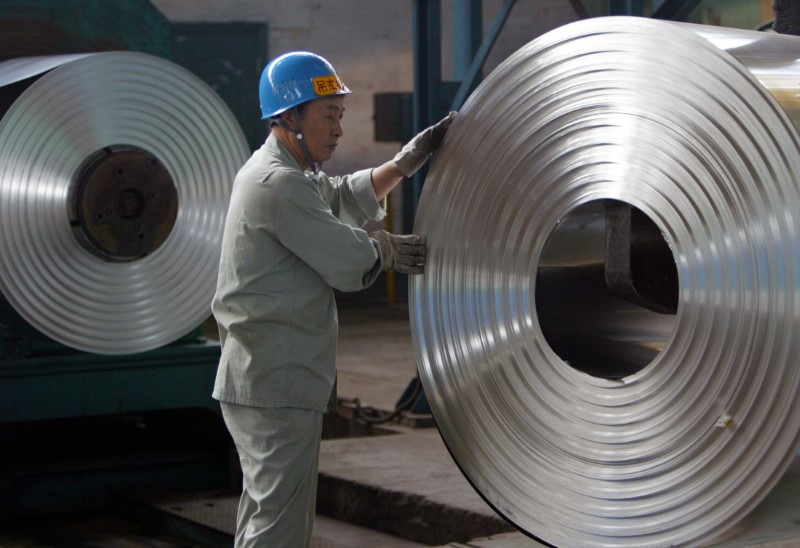By Yawen Chen and Nicholas Heath
BEIJING (Reuters) - China's producer price inflation cooled for the first time in seven months in March as iron ore and coal prices tumbled, pressured by fears that Chinese steel production is outweighing demand and threatening a glut of the metal later this year.
A renaissance in China's steel industry has been a major driver of the world's second-largest economy in recent quarters, helping generate the strongest profit growth in years and adding to a reflationary pulse across the global manufacturing sector.
But after cranking out as much metal as possible in recent months, Chinese steel mills are now starting to cut prices, threatening to snuff out a bull market that had pushed prices of some steel construction products to their highest since 2014.
Still, while China's producer price inflation has likely passed its peak, it is likely to remain high for a bit longer, keeping profits at a reasonable level, ANZ said in a note.
That should give China's central bank confidence to continue with gradual monetary policy tightening as it tries to coax companies to reduce high levels of debt, ANZ economists said, predicting further hikes in short-term interest rates this year.
China's producer price index (PPI) rose 7.6 percent in March from a year earlier, still elevated but in line with expectations and easing from 7.8 percent in February, a 9-year high, the National Bureau of Statistics said on Wednesday.
Economists polled by Reuters had forecast a softer reading as a torrid rally in China's commodity markets showed signs of correcting, and on expectations that measures to cool the country's overheated housing market would eventually slow demand for steel and other building materials. [IRONORE/]
On a month-on-month basis, the PPI rose just 0.3 percent, the smallest increase since September 2016 and half the pace seen in February.
China's factory gate prices had only turned positive on year-on-year basis last September, after falling for nearly five years, leaving many industrial firms saddled with idle capacity and less cash flow to service their debts.
CONSUMER INFLATION REMAINS BENIGN
China's consumer inflation rate has been far milder, edging up to 0.9 percent in March, from 0.8 percent in February.
Food prices, the biggest component of the consumer price index (CPI), fell by 4.4 percent.
Non-food inflation inched up to 2.3 percent, with costs for health care, housing, transportation and communication all rising, suggesting stronger demand from an increasingly wealthy and rapidly ageing population.
Analysts polled by Reuters had predicted March consumer inflation would edge up to 1.0 percent, but remain well within the central bank's comfort zone.
Still-modest consumer inflation and moderating producer prices will give policymakers room to continue with their campaign to reduce risks in the financial system after years of debt-fuelled stimulus.
The People's Bank of China (PBOC) last month completed its most rigorous quarterly inspection of the nation's banks to date to get a better idea of the problems it is facing.
The China Banking Regulatory Commision (CBRC) has told banks to conduct "self inspections" so it can understand the amount of leverage in the banking system and prevent lenders from hiding the true extent of sour loans, three sources told Reuters on Monday.
The PBOC has raised interest rates on money market and special short- and medium-term loans several times already this year to encourage companies to reduce debt.
ANZ expects another two 10-basis point hikes in the 7-day reserve repo rate and other medium-term rate hikes for the rest of the year, though analysts expect the PBOC to tread cautiously to avoid crimping economic growth.
COMMODITY PRICES LOSING STEAM
Similar to previous months, much of the annual surge in producer inflation in March was largely driven by higher prices of raw materials for steelmaking products such as iron ore and coking coal, which are benefiting from a construction boom.
But China's months-long commodities rally is showing signs of crumbling. Steel futures fell 5 percent on Friday, their steepest single-day drop in two months.
Top listed steelmaker Baoshan Iron & Steel (SS:600019) (Baosteel) said on Monday it has cut prices for May delivery, ending a long streak of price hikes. Baosteel usually sets the tone for the industry.
Adding to easing producer inflation is a deceleration in global oil price growth, according to estimates by ING's chief Asia economist Tim Condon. China cut gasoline and diesel retail prices late last month by the most so far this year.
The inflation readings will be followed by March trade data on Thursday, bank lending in coming days, and industrial output, retail sales and investment on April 17.

China's first-quarter gross domestic product (GDP) will also be released on the 17th, and is expected to show resilient growth at the start of 2017.